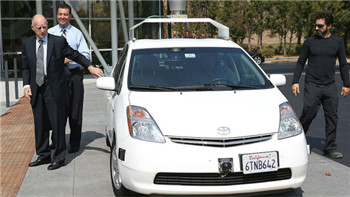(单词翻译:单击)

A self-driving start-up in Silicon Valley is exploring emojis as a robotic response to the honks, nods, waves and other signals exchanged between human road users.
硅谷一家自动驾驶初创公司正在探索利用表情符号自动回应鸣喇叭、点头、挥手等人类道路使用者之间交换的信号。
Drive.ai is beginning a test near its Mountain View headquarters of autonomous cars fitted with digital signage on their roofs.
Drive.ai公司正在位于山景城(Mountain View)的总部附近对车顶装有数字显示屏的自动驾驶汽车进行测试。
The display, which also incorporates an array of cameras and sensors for navigation, can show text and pictures, as well as making sounds, to provide cues to human drivers of the robot’s intentions.
这种显示屏还包含一组用于导航的摄像头及传感器,它能够显示文本和图片,还可以发出声音,以向人类司机提示无人车的意图。
If you take the driver out of the equation, how do other human beings communicate with this car? A self-driving car needs to emote intention, understand what the other cars are doing and signal to them what it wants to do, said Carol Reiley, co-founder and president of the year-old company.
这家成立仅一年的公司的联合创始人、总裁卡萝尔•赖利(Carol Reiley)表示:如果你的车里没有驾驶员,其他人该怎样与这辆车沟通?自动驾驶汽车需要表达意图,领会其他车辆正在做什么并向它们发出信号,告知它想做什么。
Among the signs being tested are the smiley faces, winks and hand gestures of emoji that have become a popular addition to text messaging and social networking in recent years.
正在被测试的信号包括笑脸、眨眼、手势等各种表情符号,这些表情包近年来已经成为短信与社交网络中很流行的附加符号。
We are anticipating that people’s behaviour will be very different around self-driving cars [compared] to normal cars, she said. We aren’t satisfied with the lights and sounds on a current car.
我们认为,相对普通汽车,人类驾驶员在自动驾驶汽车周围时的行为将大为不同,她说,我们并不满足于现有汽车的灯光和声音。
We need to design a new kind of robot that can communicate safely and interact with people.
我们需要设计一种能够安全地与人类沟通和互动的新型机器人。
While most robots in use are in factories, cordoned off behind warning notices, Ms Reiley said that a self-driving car would be the first social robot that will be released into the world.
虽然大多数在使用的机器人都位于工厂且被警戒线隔离在警示告示之后,但赖利表示,自动驾驶汽车将成为首个被投放到真实世界的社交型机器人。
Drive.ai, which has raised $12m from undisclosed investors, was founded last year by Stanford University graduates.
由斯坦福大学(Stanford University)几名毕业生去年创立的Drive.ai,已从未公开的投资人手中筹集了1200万美元。
They had been working to apply deep learning, a strand of artificial intelligence research, to driving.
他们一直在致力于将深度学习(人工智能研究的一个分支)应用于驾驶。
In April, Drive.ai became the 13th company to be approved for autonomous testing in California by the state’s Department of Motor Vehicles .
今年4月,Drive.ai成为第13家获得加州机动车辆管理局(Department of Motor Vehicles)批准进行自动驾驶测试的公司。
While others are focused on highway driving, Drive.ai is targeting more crowded and complex urban environments for its first deployments.
虽然其他一些公司正专注于高速公路驾驶测试,但Drive.ai首批测试的目标是更拥挤、更复杂的城市环境。


